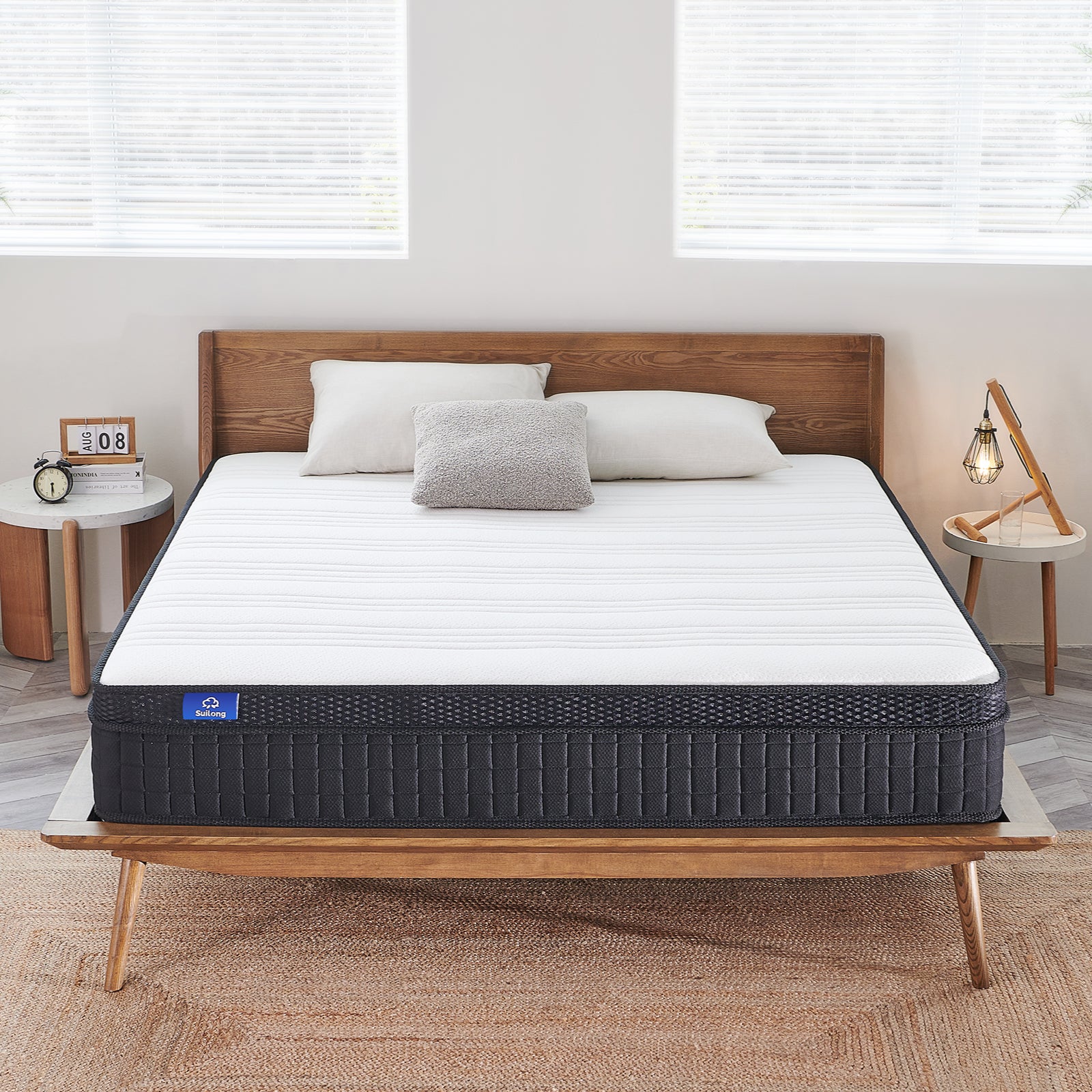How Should I Sleep To Avoid Hip Pain?

Explore our expert guide on choosing the right mattress for hip pain relief. Discover how mattress firmness affects hip discomfort and learn the best sleep positions to alleviate pain. Ideal for those seeking comfortable, pain-free sleep.
In this article, I'm going to delve into a very practical topic: should you choose a soft or firm mattress when you're experiencing hip pain? Many people are confused by this question, and the right mattress choice is crucial to ensuring a good night's rest and pain relief. Next, I will analyse this question from a number of angles to help you make an informed choice.
1. Common Causes of Hip Pain
1.1 Physiological Factors Leading to Hip Pain
Firstly, let's look at some of the common physiological factors that lead to hip pain. Often, conditions such as hip osteoarthritis, muscle strains or tendonitis can lead to hip pain. These pains can be caused by long-term joint wear and tear, sports injuries or due to certain health conditions. Understanding these causes is crucial to choosing the right mattress.
1.2 The Impact of Lifestyle Habits on Hip Pain
Next, we explore how lifestyle habits can affect hip pain. Hip pain can be exacerbated by prolonged sitting or poor sleeping positions. For example, sleeping in the same position for long periods of time, especially on your side, may put extra pressure on your hips.
2. Hard vs. soft mattresses: which is better for hip pain relief?
2.1 Advantages and disadvantages of hard mattresses
Let's start by discussing hard mattresses. Firm mattresses usually provide better support, which is important for maintaining the natural curve of the spine. For back sleepers or heavier people, a hard mattress provides firm support and reduces body sinkage. However, for people with hip pain, a hard mattress may not be soft enough to provide adequate cushioning, which can exacerbate the pain.
2.2 Advantages and disadvantages of soft mattresses
Comparatively speaking, soft mattresses provide better pressure relief. Especially for side sleepers, soft mattresses can better conform to the body's curves and reduce pressure on the hips and shoulders. However, soft mattresses may lack adequate support and may not be the best choice, especially for people with back and lower back pain.
Now, let's take a closer look at the different types of mattresses and their impact on hip pain, including the popular memory foam mattresses and hybrid mattresses.
3. Types of mattresses and hip pain
3.1 Are memory foam mattresses suitable for people with hip pain?
Now let's look at memory foam mattresses. Memory foam is known for its ability to change shape based on body temperature and weight. It distributes body weight and reduces pressure on the hips, so it may be a good choice for people with hip pain. However, memory foam mattresses have their limitations, such as heat retention issues and less resilience.
3.2 Effectiveness of Hybrid Mattresses and Other Types of Mattresses
Let's move on to hybrid mattresses. A hybrid mattress combines the benefits of a memory foam or latex top layer with a spring mattress base layer to provide excellent support and comfort. These mattresses can provide the right amount of support for hip pain sufferers while also relieving pressure points.
Next, I will guide you on how to choose the right mattress firmness for your situation, as well as explore the effects of different firmness mattresses on hip pain.
4. How to choose the right mattress firmness?
4.1 Assessing Individual Needs
Choosing the right mattress firmness starts with assessing your individual needs. Consider your sleeping position, your weight, and whether you have any specific health problems, such as hip pain. For example, side sleepers may be better suited to a softer mattress so that the mattress conforms to the curves of their body, while back and stomach sleepers may need a firmer mattress to keep their spine aligned.
4.2 Mattress Firmness in Relation to Back and Hip Pain
Mattress firmness is crucial for back and hip pain relief. A mattress that is too soft may cause the body to sink, which can cause the spine to curve incorrectly, while a mattress that is too firm may exacerbate pressure points in the hips and back. Therefore, choosing a mattress that provides both proper support and pressure point relief is key.
Below, I will discuss how sleep position affects hip pain and offer some suggestions for improving sleep position to further help alleviate hip pain.
5. Relationship between sleep position and hip pain
5.1 Recommended Sleep Positions for Hip Pain Relief
Proper sleep position can significantly reduce hip pain. For example, side sleepers can try placing a pillow between their knees to reduce pressure on the hips. Back sleepers should ensure that their spine maintains its natural curve and may need to place pillows under their knees for extra support.
5.2 Use of Sleep Aid Products
In addition to choosing the right mattress, it is also important to use the right sleep aids. For example, specially designed pillows and mattress padding can help improve sleeping posture and reduce pressure on the hips and back. These products can complement your choice of the right mattress to provide the best sleep experience.
Now, you've learned how to choose the right mattress for hip pain relief and how to further reduce your symptoms by adjusting your sleeping position. We hope this information will help you have a more comfortable and rewarding sleep experience.
Read More:
https://suilong.org/blogs/blogs/best-mattress-for-heavy-people-2023
https://suilong.org/blogs/blogs/best-mattresses-for-side-sleepers-according-to-experts
FAQs
Q1: What are the common causes of hip pain related to sleep?
A1: Common causes include arthritis, muscle strains, and poor sleep postures leading to added pressure on the hip joints.
Q2: Is a firm or soft mattress better for hip pain?
A2: It depends on personal preference and sleep position. Soft mattresses can relieve pressure on hips, especially for side sleepers, while firm mattresses offer better support, particularly beneficial for back sleepers.
Q3: Can memory foam mattresses help with hip pain?
A3: Yes, memory foam mattresses are often recommended for hip pain as they conform to the body’s shape, providing pressure relief and support.
Q4: Are hybrid mattresses good for hip pain?
A4: Hybrid mattresses, combining memory foam and innerspring, offer a balance of support and comfort, making them a good option for hip pain relief.
Q5: What mattress firmness is best for lower back and hip pain?
A5: Medium-firm mattresses are generally best for lower back and hip pain, as they provide a balance of comfort and support.
Q6: How should I sleep to avoid aggravating hip pain?
A6: Sleeping on your back with a pillow under your knees or on your side with a pillow between your knees can help align your hips and reduce pain.
Q7: What features should I look for in a mattress if I have bad hips and back?
A7: Look for a mattress that offers medium-firm support, pressure relief, and enough cushioning to contour to your body shape.
Q8: Can changing my sleep position improve hip pain?
A8: Yes, adjusting your sleep position to reduce pressure on your hips, such as sleeping on your side with a pillow between your knees, can help.
Q9: Do I need a special type of mattress if I have hip pain?
A9: While not necessarily a special type, mattresses that offer good support and pressure relief, like memory foam or hybrid mattresses, are beneficial.
Q10: How often should I replace my mattress to maintain hip comfort?
A10: Mattresses should generally be replaced every 7-10 years, but if you experience increased hip pain or a decrease in comfort, consider replacing it sooner.


















